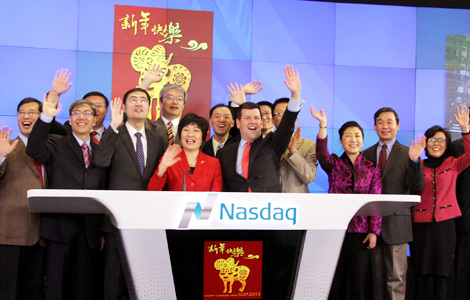China tilts to Kabul with US pullout
Updated: 2015-02-19 12:21
By Pu Zhendong in Beijing(China Daily USA)
|
||||||||
Following the Pentagon's pullout of main US forces from Afghanistan, Beijing is proactively participating in the landlocked country's economy and peace process to avert further terror-incited turbulence from undermining China's regional development initiatives, observers said.
Early this month, China, Afghanistan and Pakistan co-hosted the first round of strategic talks in Kabul, reaffirming trilateral cooperation in areas of infrastructure projects, counter-terrorism and Afghan stability.
China agreed to support projects aimed at enhancing highway and railway connection, and economic interaction between Afghanistan and Pakistan, including building the Kunar hydropower dam that can provide electricity to the two neighbors.
"The dialogue was a useful attempt as the three countries are committed to enhancing three-way communication and cooperation in response to the fast-changing regional situation," said Chinese Foreign Ministry spokeswoman Hua Chunying on Feb 9.
Fragile security conditions in Afghanistan greatly concerned neighboring China and Pakistan, who urged stronger security collaboration on counter-terrorism during the dialogue, as terrorism, extremism and separatism pose grave threat to the three countries and the region.
In October, Beijing hosted the Istanbul Process ministerial conference during Afghan President Ashraf Ghani's inaugural visit to China, and pledged another $327 million reconstruction aid to Kabul through 2017.
It was also reported that Beijing received a visiting Taliban delegation in November, but the Chinese Foreign Ministry did not confirm the arrangement, saying China supports the "Afghan-led and Afghan-owned" process toward reconciliation and wishes to be constructive to that end.
Chinese analysts said Beijing seeks to play a "more coordinative" role to facilitate the peace process in Afghanistan, considering its political turmoil challenges and stability of the bordering Xinjiang Uygur autonomous region.
"China not only increased its amount of financial aid to Kabul, but also sought to include Afghanistan in regional security frameworks such as the Shanghai Cooperation Organization," said Fu Xiaoqiang, an expert on South Asian studies at the China Institutes of Contemporary International Relations.
The SCO has absorbed Afghanistan as an observer since 2012, and held a series of multi-lateral consultations and counter-terrorism exercises on this issue.
Describing Kabul as a "key hub" on China's strategic layout of the "Silk Road Economic Belt", Fu said the Afghan authority is also keen to take the express lane of China's fast development, but the success of the initiative hinges on security conditions of the traumatized country.
"Beijing and Kabul working together on security issues aims at seeking solutions to guarantee a smooth process of post-conflict state-building," he added.
The withdrawing Washington also welcomed China's deeper involvement in the region, echoing the notion of analysts that a stabilized Kabul is of common interest to the two powers.
Late last month, Undersecretary of State for Political Affairs Wendy Sherman said in Beijing that Chinese investment and China's economic development along the Silk Road "help create comprehensive trade relationship", which is "critical" for the future of Afghanistan.
Meanwhile, the United States and allies formally concluded their combat mission in Afghanistan in December. According to a timetable approved by President Barack Obama, the Pentagon plans a total withdrawal of US troops by the end of 2016, thereby ending its 13-year war there, the longest in US history.
Only around 10,000 US soldiers will be left behind to perform support and counterterrorism responsibilities. Afghan President Ghani called on the US to "re-examine" its timetable for removing military forces.
"A new round of reshuffling among Afghan political fractions awaits following the US pullout, since the remaining troops are not capable of controlling the chaotic situation," said Li Haidong, a professor of US studies at China Foreign Affairs University.
"It seems the US is eager to shake off the burden of Afghanistan while it has already too many priorities at hand, such as the Ukraine crisis and Iran," Li said.
puzhendong@chinadaily.com.cn
Most Viewed
Editor's Picks

|

|

|

|

|

|
Today's Top News
NBA China CEO sees the sport proliferate
China tilts to Kabul with US pullout
No letup seen for business travel
China No 1 dumper of plastic into ocean
Chinese visitors set to celebrate New Year worldwide
Chinese students gather in Washington
Upbeat on US-China relations
Beijing-San Jose nonstop planned
US Weekly

|

|















